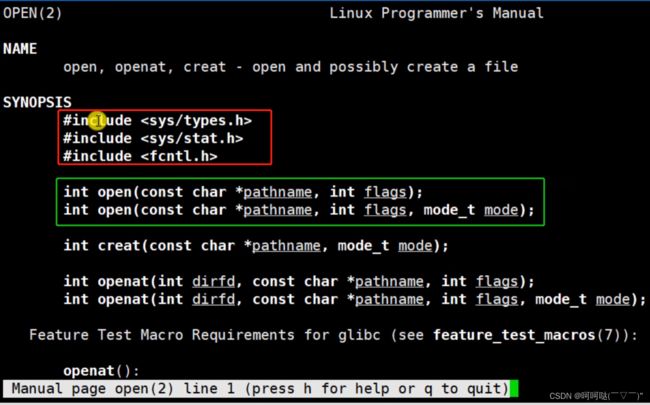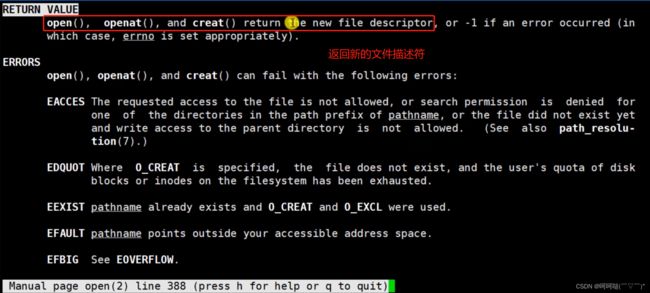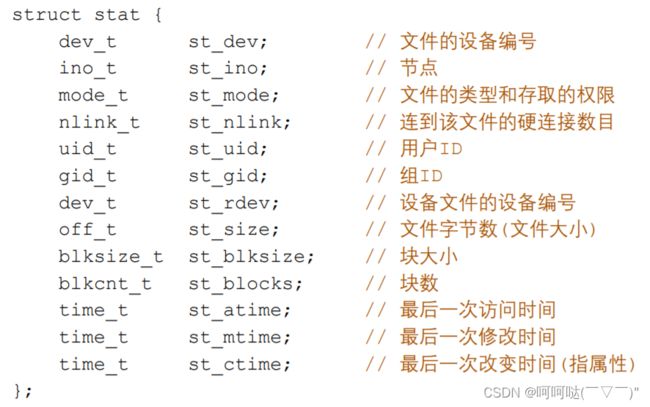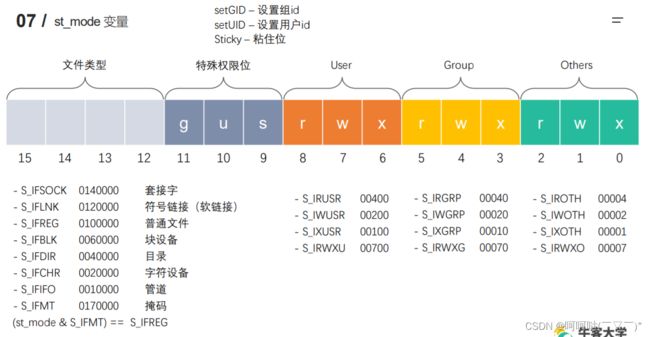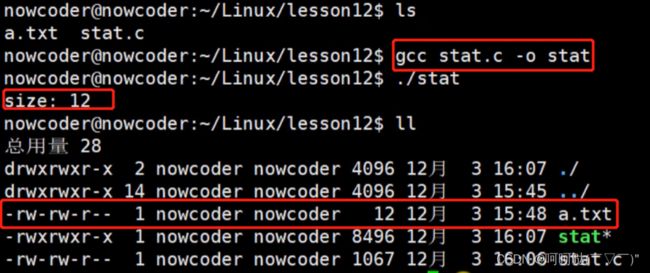基于linux下的高并发服务器开发(第一章)- Linux系统IO函数
05 / Linux系统IO函数
(1)man 2 open
>>打开一个已经存在的文件
int open(const char *pathname, int flags);
参数:
pathname:要打开文件路径
- flags:对文件的操作权限设置还有其他的设置
O_RDONLY,O_WRONLY,O_RDWR 这三个设置是互斥的
返回值:
返回一个新的文件描述符,如果调用失败,返回-1
查看返回值
(2)man 3 perror
作用:打印errono对应的错误描述
void perror(const char *s);
s参数:用户描述,比如hello,最终输出的内容是 hello:xxx(实际的错误描述)
open.c
/*
#include
#include
#include
//打开一个已经存在的文件
int open(const char *pathname, int flags);
参数:
pathname:要打开文件路径
- flags:对文件的操作权限设置还有其他的设置
O_RDONLY,O_WRONLY,O_RDWR 这三个设置是互斥的
返回值:
返回一个新的文件描述符,如果调用失败,返回-1
errno:属于Linux系统函数库,库里面的一个全局变量,记录的是最近的错误号
#include
void perror(const char *s);
s参数:用户描述,比如hello,最终输出的内容是 hello:xxx(实际的错误描述)
作用:打印errono对应的错误描述
//创建一个新的文件
int open(const char *pathname, int flags, mode_t mode);
*/
#include
#include
#include
#include
#include
int main(){
// 打开一个文件
int fd = open("a.txt",O_RDONLY);//fd 文件描述符
if(fd == -1){
perror("open");
}
// 读写操作
// 关闭
close(fd);
return 0;
} create.c
/*
#include
#include
#include
int open(const char *pathname, int flags, mode_t mode);
参数:
- pathname:要创建的文件的路径
- flags:对文件的操作权限和其他的设置
- 必选项:O_RDONLY, O_WRONLY, O_RDWR 这三个之间是互斥的
- 可选项:O_CREAT 文件不存在,创建新文件
- mode:八进制的数,表示创建出的新的文件的操作权限,比如:0775
最终的权限是:mode & ~umask
0777 -> 111111111
& 0775 -> 111111101
----------------------------
111111101
按位与:0和任何数都为0
umask的作用就是抹去某些权限。
flags参数是一个int类型的数据,占4个字节,32位。
flags 32个位,每一位就是一个标志位。
*/
#include
#include
#include
#include
#include
int main() {
// 创建一个新的文件
int fd = open("create.txt", O_RDWR | O_CREAT, 0777);
if(fd == -1) {
perror("open");
}
// 关闭
close(fd);
return 0;
} #include
ssize_t read(int fd, void *buf, size_t count);
参数:
- fd:文件描述符,open得到的,通过这个文件描述符操作某个文件
- buf:需要读取数据存放的地方,数组的地址(传出参数)
- count:指定的数组的大小
返回值:
- 成功:
>0: 返回实际的读取到的字节数
=0:文件已经读取完了
- 失败:-1 ,并且设置errno#include
ssize_t write(int fd, const void *buf, size_t count);
参数:
- fd:文件描述符,open得到的,通过这个文件描述符操作某个文件
- buf:要往磁盘写入的数据,数据
- count:要写的数据的实际的大小
返回值:
成功:实际写入的字节数
失败:返回-1,并设置errno
copyfile.c
/*
#include
ssize_t read(int fd, void *buf, size_t count);
参数:
- fd:文件描述符,open得到的,通过这个文件描述符操作某个文件
- buf:需要读取数据存放的地方,数组的地址(传出参数)
- count:指定的数组的大小
返回值:
- 成功:
>0: 返回实际的读取到的字节数
=0:文件已经读取完了
- 失败:-1 ,并且设置errno
#include
ssize_t write(int fd, const void *buf, size_t count);
参数:
- fd:文件描述符,open得到的,通过这个文件描述符操作某个文件
- buf:要往磁盘写入的数据,数据
- count:要写的数据的实际的大小
返回值:
成功:实际写入的字节数
失败:返回-1,并设置errno
*/
#include
#include
#include
#include
#include
int main() {
// 1.通过open打开english.txt文件
int srcfd = open("english.txt", O_RDONLY);
if(srcfd == -1) {
perror("open");
return -1;
}
// 2.创建一个新的文件(拷贝文件)
int destfd = open("cpy.txt", O_WRONLY | O_CREAT, 0664);
if(destfd == -1) {
perror("open");
return -1;
}
// 3.频繁的读写操作
char buf[1024] = {0};
int len = 0;
while((len = read(srcfd, buf, sizeof(buf))) > 0) {
write(destfd, buf, len);
}
// 4.关闭文件
close(destfd);
close(srcfd);
return 0;
}
lseek.c
标准C库的函数
#include
int fseek(FILE *stream, long offset, int whence);Linux系统函数
#include
#include
off_t lseek(int fd, off_t offset, int whence);
参数:
- fd:文件描述符,通过open得到的 通过这个fd操作某个文件
- offset:偏移量
- whence:
SEEK_SET
设置文件指针的偏移量
SEEK_CUR
设置偏移量:当前位置 + 第二个参数offset的值
SEEK_END
设置偏移量:文件大小 + 第二个参数offset的值
返回值:返回文件指针的位置
作用:
1.移动文件指针到文件头
lseek(fd, 0, SEEK_SET);2.获取当前文件指针的位置
lseek(fd, 0, SEEK_CUR);3.获取文件长度
lseek(fd, 0, SEEK_END);4.拓展文件的长度,当前文件10b, 110b, 增加了100个字节
lseek(fd, 100, SEEK_END)
注意:需要写一次数据
/*
标准C库的函数
#include
int fseek(FILE *stream, long offset, int whence);
Linux系统函数
#include
#include
off_t lseek(int fd, off_t offset, int whence);
参数:
- fd:文件描述符,通过open得到的 通过这个fd操作某个文件
- offset:偏移量
- whence:
SEEK_SET
设置文件指针的偏移量
SEEK_CUR
设置偏移量:当前位置 + 第二个参数offset的值
SEEK_END
设置偏移量:文件大小 + 第二个参数offset的值
返回值:返回文件指针的位置
作用:
1.移动文件指针到文件头
lseek(fd, 0, SEEK_SET);
2.获取当前文件指针的位置
lseek(fd, 0, SEEK_CUR);
3.获取文件长度
lseek(fd, 0, SEEK_END);
4.拓展文件的长度,当前文件10b, 110b, 增加了100个字节
lseek(fd, 100, SEEK_END)
注意:需要写一次数据
*/
#include
#include
#include
#include
#include
int main() {
int fd = open("hello.txt", O_RDWR);
if(fd == -1) {
perror("open");
return -1;
}
// 扩展文件的长度
int ret = lseek(fd, 100, SEEK_END);
if(ret == -1) {
perror("lseek");
return -1;
}
// 写入一个空数据
write(fd, " ", 1);
// 关闭文件
close(fd);
return 0;
}
06 / stat 结构体
#include
#include
#includeint stat(const char *pathname, struct stat *statbuf);
作用:获取一个文件相关的一些信息
参数:
- pathname:操作的文件的路径
- statbuf:结构体变量,传出参数,用于保存获取到的文件的信息
返回值:
成功:返回0
失败:返回-1 设置errnoint lstat(const char *pathname, struct stat *statbuf);
参数:
- pathname:操作的文件的路径
- statbuf:结构体变量,传出参数,用于保存获取到的文件的信息
返回值:
成功:返回0
失败:返回-1 设置errno
stat.c
/*
#include
#include
#include
int stat(const char *pathname, struct stat *statbuf);
作用:获取一个文件相关的一些信息
参数:
- pathname:操作的文件的路径
- statbuf:结构体变量,传出参数,用于保存获取到的文件的信息
返回值:
成功:返回0
失败:返回-1 设置errno
int lstat(const char *pathname, struct stat *statbuf);
参数:
- pathname:操作的文件的路径
- statbuf:结构体变量,传出参数,用于保存获取到的文件的信息
返回值:
成功:返回0
失败:返回-1 设置errno
*/
#include
#include
#include
#include
int main() {
struct stat statbuf;
int ret = stat("a.txt", &statbuf);
if(ret == -1) {
perror("stat");
return -1;
}
printf("size: %ld\n", statbuf.st_size);
return 0;
} 创建软链接
![]()

